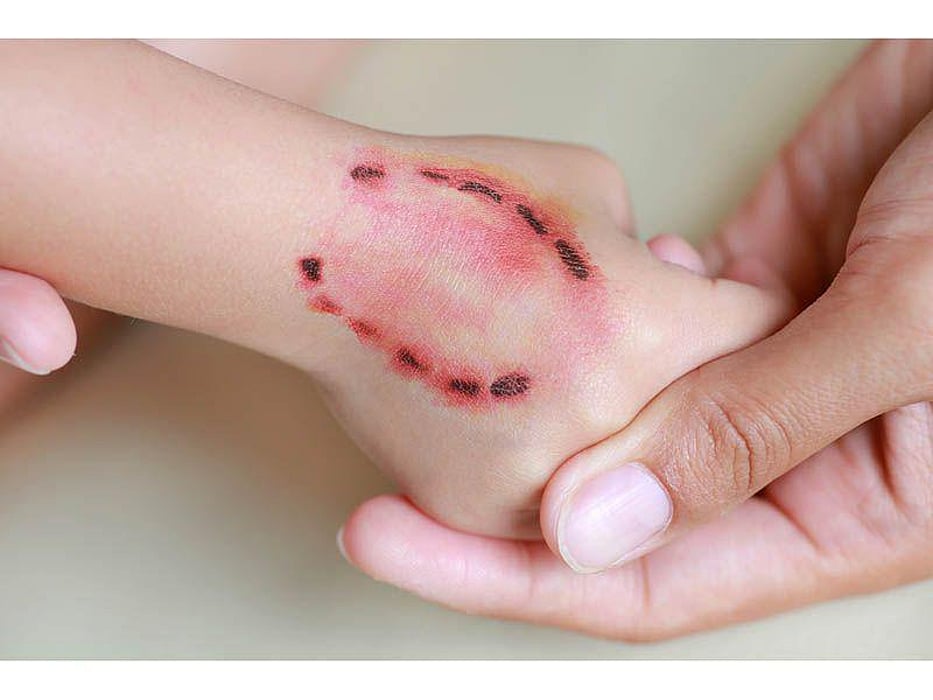Human Bites

What should I do if another child bites my child?
The first step is to wash the wound carefully with soap and water, since human bites are even more likely to become infected than animal bites. If the skin is broken, call your doctor to see if she wants you to bring your child in for an evaluation. If the wound is minor, apply an antibiotic ointment twice a day. If the injury's in an area that tends to get dirty, cover the wound with an adhesive bandage. Otherwise, leave it exposed to the air. In addition, check to be sure your child's tetanus shots are up to date.
If the injury is possibly serious -- if the skin is broken and bleeding -- apply a gauze pad or clean cloth to the wound and press with your fingers. Once the bleeding has stopped, cover the area with a bandage and take your child to the nearest emergency room. A deep or jagged bite may require stitches. If pressure doesn't stop the bleeding, call 911 for emergency medical care.
Whether the bite is minor or serious, be sure to notify your doctor, since the risk of infection is high. One in 10 human bites becomes infected, according to a recent study. All bites to the face, hands, or genitals should be examined by your doctor immediately, since these are more likely to involve serious injuries.
What kinds of infections can be spread by biting?
Bites can transmit many serious illnesses, including hepatitis and even HIV, the virus that causes AIDS. Of course, these aren't likely to be carried by children. But more common bacterial infections such as staph can spread this way easily, so it's important to take bites seriously. Your doctor will assess your child to see if a tetanus shot or booster is appropriate. If the biter is known to be infected with HIV or hepatitis B, your doctor can begin treatments that reduce the risk of transmission to your child.
How do I know if the area is infected?
If the bite requires stitches, the doctor will likely prescribe an antibiotic to prevent infection. If you treat a minor bite at home, keep an eye on your child for the next few days. Signs of infection include the following:
- Increased swelling, redness, or tenderness at the site
- Pus at the site
- Fever of 100 degrees or higher
- Red streaks or a feeling of heat extending from the bite.
If any of these symptoms appears -- or if your child begins to act sick -- call the doctor immediately. Also see your child's doctor promptly if the bite doesn't heal in 10 days.
What can I do to prevent future bites?
If your child was bitten in school or daycare, talk to the teacher or administrator right away; ask him or her to alert the parents of the child who bit your child. If the bite occurred during a fight, try to resolve the conflict - and talk to your child about ways to work out arguments peacefully. If it occurred during rough-housing, talk to your child about safer ways to play. Notify the other child's parents if your child's school or daycare hasn't already done so. Health experts recommend that children in school or daycare receive both a tetanus and hepatitis B vaccination.
References
The ABCs of Safe and Healthy Child Care. Aggressive Behavior and Bites. Centers for Disease Control.
Human Bites. National Library of Medicine.
Related Posts
Gun Deaths to Kids Are Rising in Pandemic, U.S. Hospital Study Shows
MONDAY, Jan. 16, 2023 (HealthDay News) -- If a study conducted at one St. Louis...
Un hospital defiende la decisión de negar un trasplante de corazón a un hombre sin vacunar
JUEVES, 27 de enero de 2022 (HealthDay News) -- En respuesta a las afirmaciones...
Shyness, Ages 3 to 6
As your child moves into the preschool and kindergarten years, behavior that...
No Fewer Deaths Seen With Restricted IV Fluid for Septic Shock
FRIDAY, June 17, 2022 (HealthDay News) -- For adults in the intensive care unit...
